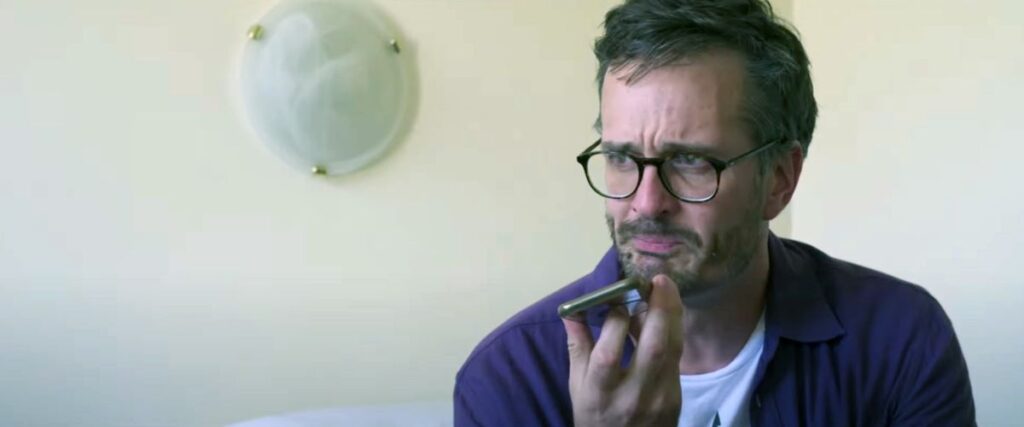Back in 2016, New Zealand journalist David Farrier turned a small obsession into a huge hit with his documentary Tickled, a deeply surprising look at the supposed sport of professional endurance tickling. What started as a quirky lifestyle article on a few online videos featuring young, athletic men being tied up and tickled spiraled into a personal journalistic quest that took Farrier through cutouts and stolen identities, lawsuits and blackmail and physical threats, and a series of “Okay, seriously, what the hell?” revelations. It’s a mesmerizing movie, in part because the stakes are so small, and yet the fury of the shadowy figure behind it all is so volatile and outsized.
Farrier taps into a very similar story with his 2023 documentary Mister Organ, now streaming on Netflix. It starts in much the same way, with Farrier reporting on a small, quirky story that blows up: In this case, a parking attendant at a New Zealand antiques shop extorting $700 or more out of any unwitting trespasser who parks in the shop’s lot. After Farrier’s 2016 report on the shop became viral news — getting so much attention and inspiring so much indignation that New Zealand eventually passed a law restricting parking-violation payouts — Farrier began investigating Michael Organ, the man responsible.
“Journalist spends years talking to one weird guy” sounds like a bizarre basis for a movie, but Mister Organ is mesmerizing and endlessly surprising in the same way Tickled is, and for much the same reasons. Farrier’s investigation leads down rabbit holes no one could possibly see coming, beginning with Organ’s past as a convicted yacht thief who claims to be a prince. Over the course of the film, he uncovers more and more weird details about the man, who gets wind of Farrier’s project and takes some distinctly alarming steps that are best discovered as the movie unfolds, with revelation after mind-boggling revelation.
But even those reveals (and the huge questions they raise) aren’t the reason Mister Organ is an endlessly discussable movie, a perfect collective-viewing conversation-starter. What makes the movie such a queasy experience is how close Farrier gets to his subject, and how that affects him. It’s a principle facet of journalism that people covering news shouldn’t become part of it, that they should stay removed and objective. But Farrier becomes a sort of reluctant friend and sounding board for Organ, who knows he’s filming a documentary, and runs hot and cold on it. Sometimes he’s participating, sometimes he’s trying to shut it down, but he’s always attempting to skew the narrative. “You probably would have been quite an interesting person to know if you weren’t such a cunt,” he tells Farrier on camera at one point.
Mister Organ becomes a shockingly uncomfortable experience as Farrier interviews Michael Organ’s former friends and roommates. He is told over and over that the man has some kind of sinister power to worm his way into people’s lives and destroy them. At the same time, Organ seems to be trying to do the same to Farrier. At one point, Farrier mutes himself during a long, rambling phone call from Organ to talk to the camera about how endlessly boring the man is. At another, he captures himself on camera breaking down and crying as he talks about how trapped he feels because of the project, and how he’s finding Organ mind-numbing and inescapable.
“I don’t quite understand why he winds me up so much,” Farrier tells an unidentified party on the phone. “Like, I can spend time with, like, a lot of dimwits, and, like, a lot of people that are boring, but it’s like — I can’t be in the room with him. I’m trapped. It’s a weird situation for me, because I’m trapped with him […] ’cause I have to make a film, right? So there’s no out.”
Image: Submarine Entertainment/Everett Collection
That personal dynamic — the sense that Farrier has made himself and his response to his subject part of his story, and that he’s abandoned any form of objectivity in favor of just expressing his frustration and disgust with the man — is an unusual direction for a documentary to take, and it’s one that invites a great deal of analysis and discussion. By the end of the movie, Farrier’s clear dislike of Organ pushes him to try increasingly direct tactics to uncover the truth about the man, including in some particularly squirmy scenes where he confronts members of Organ’s family, who understandably object to someone showing up on their front porch unannounced with a camera, trying to grill them about their con artist relative.
That, and many other things about Mister Organ, may shift sympathies away from Farrier. But they never shift toward Organ himself, who — much like the gradually revealed subject of Tickled — seems like a monstrous person best kept at a distance. Farrier doesn’t have that luxury. In both of these movies, he takes a lot of risks — narrative ones, in terms of creating documentaries with a distinctive personality and approach that’s unlike anyone else currently making docs, and personal ones, in terms of angering people whose histories show they have dangerous ways of lashing out.
In both these movies, Farrier pokes bears so we don’t have to, and lets us watch from a safe remove. Neither of them are entirely comfortable experiences, but they’re both fascinating, queasy, and the kinds of movies you’ll probably want to pass on to someone else immediately after a viewing, with a hearty “Okay, you have to watch this — you aren’t going to believe where this story goes.”
Mister Organ is streaming on Netflix. Tickled, which is also well worth watching, is free to watch with ads on Fubo, Plex, and Vudu, and is available for rental on Amazon, Google Play, and other digital platforms.

